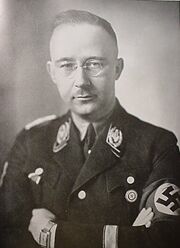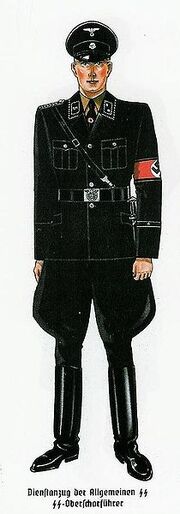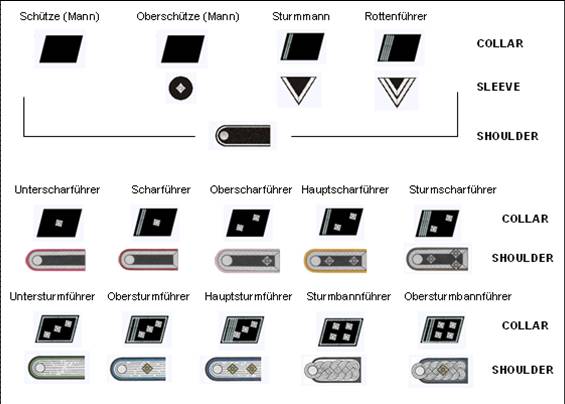The Schutzstaffel (Protective Echelon) or SS is the paramilitary wing of the Nationalsozialistische Volkspartei.
History[]
The SS was originally founded as a group of 10 elite soldiers personally assigned to protect Johann Klug. As the party grew in size and national importance then SS grew with it. By 2773 it had 2 regiments and a total of 10,000 personel. All these men were put through training even those in the Bundeswehr considered to be a bit extreme. As the SS grew it began to protect NSVP facilites around Dundorf and a select group of high-ranking NSVP members. In 2776 the SS began to officially expand again. Within weeks the SS had grown to 4 regiments totaling 20,000 personel. The NSVP is still opening the SS to new recruits and it is expected that the SS will have atleast 5 division and 50,000 total personel.
Size, Organization, and Training[]

Ceremonial formation of SS troops
The SS is currently composed of 6 divisions equaling around 60,000 personel total. Each battalion is composed of 1000 highly-trained soldiers. Each division is lead by a Gruppenführer (Group leader) which is equal to a Generalmajor (Major General) in the Bundeswehr. Each regiment is led by a Standartenführer (Regiment Leader) who is equivilant to an Oberst (Colonel) in the Heer. The SS as a whole is led by the Reichsführer-SS. The Reichsführer-SS reports directly and is responsible only to the Führer.
All members of the SS are put through a 20 week training program. They are taught basic combat skills with emphasis on markmanship, physical training, and urban combat. All recruits are required to be able to hit a moving target at 275 metres and a stationary target at 450 metres. They are then taught combat tactics with an emphasis on urban tactics but with extensive training in all combat situations. In the final week of training the recruits are put through a combat simulation. The recruits will go through a reenactment of the Battle of Dunburg in the Third Dundorfian Civil War. To pass, every recruit must accumulate atleast 500 points. Points are earned by neutralizing enemy combatants (played by current SS members), completing physical activites, following orders by platoon commanders, and many other combat activities. Recruits who meet the standard training requirements are enlisted as members of the SS.
Due to the length and rigorousness of their training SS soldiers are considered better than their Heer counterparts. In fact the Heer has proposed that recruits be given the same training as the SS to improve skills for recruits. Most SS soldiers are offered jobs in the Bundeswehr Kommando Spezialkräfte but most reject the offer to aid the NSVP.
Officers are selected through a testing program that is offered to any recruit. Only ten percent of applicants pass the test. 60 percent of thoes who pass the test become officers. To be an officer a SS member must prove higher levels of thinking, problem solving under pressure, and leadership capabilities.
Duties[]
The SS is given many duties within the party. They include:
- Protection of Party officials especially the Führer.
- Guarding Party facilities
- Protecting members of the Reichstag who are NSVP members
- Dissemination of Party information
- Security at Party events

Heinrich Eicke, Reichsführer-SS
Commanders[]
- Reichsführer-SS: Heinrich Himmler
- 1. SS "Leibstandarte Johann Klug" Division: Gruppenführer Uwe Dietrich
- 2. SS "Landstorm" Division: Gruppenführer Martin Kohlroser
- 3. SS "Der Vaterland": Gruppenführer Wilhelm Mohnke
- 4. SS "Wiking": Gruppenführer Reinhard Steiner
- 5. SS "Nordland": Gruppenführer Georg Baum
- 6. SS "Florian Geyer": Gruppenführer Fritz Lombard
- Führerschutzdients: Oberstgruppenführer Adolf Heydrich
Führerschutzdients (Führer Protection Service)[]
The Führerschutzdients (Führer Protection Service) is a special regiment that is tasked specifically with protecting the Führer. The service was created when Johann Klug began to fear that certain members of the SS may try and use their position to oust him from power. All members of this service are hand picked by the Führer and are totally loyal to him. They are lead by an Oberstgruppenführer (Supreme Group Leader, has no equal in the Bundeswehr but sits between a Generalmajor and a Generalfeldmarshall) despite only being a regiment. The commander of this regiment also totally bypasses the SS chain of command and recieves orders only from the Führer. They are lead by Adolf Heydrich.

Adolf Heydrich, Oberstgruppenführer of the Führer Protection Service
Entry Requirements[]
To enter the SS a candidate must be a member of the Nationalsozialistische Volkspartei, atleast 18 years of age, no less than 1.72 metres tall, be in perfect physical condition, and have a pure Dundorfian heritage going back atleast 3 generations on both sides of the family.
Uniforms[]

SS uniform
The dress uniforms of the SS are quite distinctive. They are all black with a party armband on the left arm. The use of runic symbols and skulls along with the black uniform are all designed to instill a sense of respect in any observer.
When not in formal attire, members of the SS wear camoflage uniforms and helmets common to any military unit in the Bundeswehr. Urban camo is the most common but can change based on the situation.
Equipment[]
The SS uses mostly modern military weapons that have been purchased from the Bundeswehr upon its reduction in size or change of equipment. Also some SS equipment is somewhat older but was also bought as military surplus. All officers are given a special Luger P08 pistol that is to function as a sidearm.
Here is a list of the primary SS equipment:
- G36 assault rifle
- MG3 machine gun
- MG4 machine gun
- MP7 submachine gun (special units only)
- G24 sniper rifle (used in urban areas to protect party members from assassination)
The SS also has a number of armoured vehicles and tanks bought from military surplus. They include:
- Marder IFV
- Wiesel AWC
- AGF Serval
- Leopard 2 tanks
Criticism[]
Many people outside the NSVP air concerns over the SS. They feel that no party should be allowed to have a large paramilitary force. They also claim the the NSVP could use the SS to start a coup and take control of Dundorf by force. The NSVP rejects these claims by stating that the SS is for security purposes only and would only begin to provide state security upon legalization by the National Assembly.


